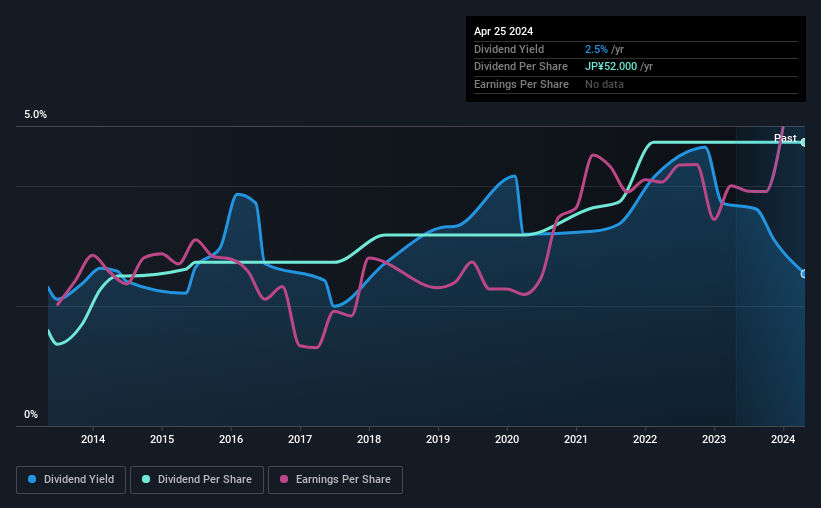Yamabiko (TSE:6250) Will Pay A Larger Dividend Than Last Year At ¥30.00

Yamabiko Corporation (TSE:6250) has announced that it will be increasing its dividend from last year's comparable payment on the 4th of September to ¥30.00. This takes the dividend yield to 2.5%, which shareholders will be pleased with.
While the dividend yield is important for income investors, it is also important to consider any large share price moves, as this will generally outweigh any gains from distributions. Investors will be pleased to see that Yamabiko's stock price has increased by 31% in the last 3 months, which is good for shareholders and can also explain a decrease in the dividend yield.
See our latest analysis for Yamabiko
Yamabiko's Earnings Easily Cover The Distributions
Impressive dividend yields are good, but this doesn't matter much if the payments can't be sustained. Before making this announcement, Yamabiko was easily earning enough to cover the dividend. As a result, a large proportion of what it earned was being reinvested back into the business.
Looking forward, earnings per share could rise by 16.8% over the next year if the trend from the last few years continues. If the dividend continues along recent trends, we estimate the payout ratio will be 24%, which is in the range that makes us comfortable with the sustainability of the dividend.

Yamabiko Has A Solid Track Record
The company has an extended history of paying stable dividends. The annual payment during the last 10 years was ¥17.50 in 2014, and the most recent fiscal year payment was ¥52.00. This works out to be a compound annual growth rate (CAGR) of approximately 12% a year over that time. So, dividends have been growing pretty quickly, and even more impressively, they haven't experienced any notable falls during this period.
The Dividend Looks Likely To Grow
Investors who have held shares in the company for the past few years will be happy with the dividend income they have received. Yamabiko has seen EPS rising for the last five years, at 17% per annum. Yamabiko definitely has the potential to grow its dividend in the future with earnings on an uptrend and a low payout ratio.
We Really Like Yamabiko's Dividend
In summary, it is always positive to see the dividend being increased, and we are particularly pleased with its overall sustainability. Distributions are quite easily covered by earnings, which are also being converted to cash flows. Taking this all into consideration, this looks like it could be a good dividend opportunity.
Investors generally tend to favour companies with a consistent, stable dividend policy as opposed to those operating an irregular one. Still, investors need to consider a host of other factors, apart from dividend payments, when analysing a company. Now, if you want to look closer, it would be worth checking out our free research on Yamabiko management tenure, salary, and performance. If you are a dividend investor, you might also want to look at our curated list of high yield dividend stocks.
New: Manage All Your Stock Portfolios in One Place
We've created the ultimate portfolio companion for stock investors, and it's free.
• Connect an unlimited number of Portfolios and see your total in one currency
• Be alerted to new Warning Signs or Risks via email or mobile
• Track the Fair Value of your stocks
Have feedback on this article? Concerned about the content? Get in touch with us directly. Alternatively, email editorial-team (at) simplywallst.com.
This article by Simply Wall St is general in nature. We provide commentary based on historical data and analyst forecasts only using an unbiased methodology and our articles are not intended to be financial advice. It does not constitute a recommendation to buy or sell any stock, and does not take account of your objectives, or your financial situation. We aim to bring you long-term focused analysis driven by fundamental data. Note that our analysis may not factor in the latest price-sensitive company announcements or qualitative material. Simply Wall St has no position in any stocks mentioned.
About TSE:6250
Yamabiko
Manufactures and sells agricultural machinery in Japan, Europe, the United States, and internationally.
Flawless balance sheet with solid track record and pays a dividend.


